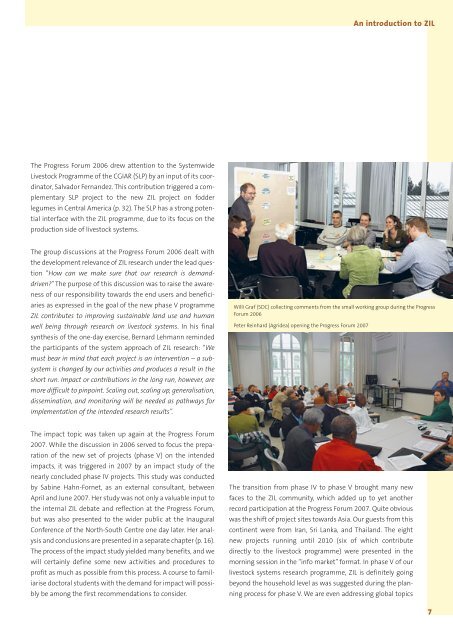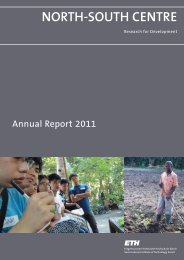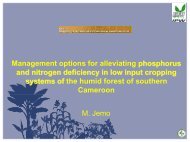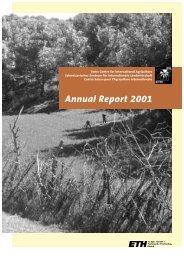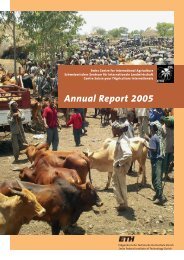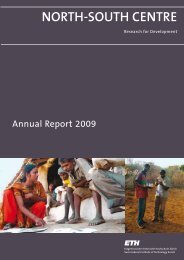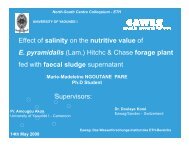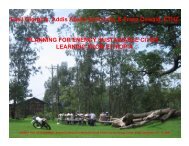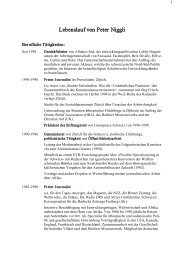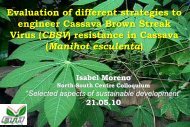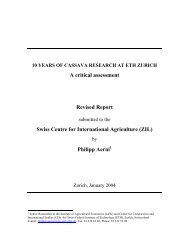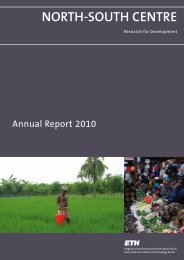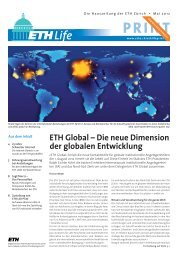Annual Report 2006/07 - ETH - North-South Centre North-South ...
Annual Report 2006/07 - ETH - North-South Centre North-South ...
Annual Report 2006/07 - ETH - North-South Centre North-South ...
Create successful ePaper yourself
Turn your PDF publications into a flip-book with our unique Google optimized e-Paper software.
An introduction to ZILThe Progress Forum <strong>2006</strong> drew attention to the SystemwideLivestock Programme of the CGIAR (SLP) by an input of its coordinator,Salvador Fernandez. This contribution triggered a complementarySLP project to the new ZIL project on fodderlegumes in Central America (p. 32). The SLP has a strong potentialinterface with the ZIL programme, due to its focus on theproduction side of livestock systems.The group discussions at the Progress Forum <strong>2006</strong> dealt withthe development relevance of ZIL research under the lead question“How can we make sure that our research is demanddriven?”The purpose of this discussion was to raise the awarenessof our responsibility towards the end users and beneficiariesas expressed in the goal of the new phase V programmeZIL contributes to improving sustainable land use and humanwell being through research on livestock systems. In his finalsynthesis of the one-day exercise, Bernard Lehmann remindedthe participants of the system approach of ZIL research: “Wemust bear in mind that each project is an intervention – a subsystemis changed by our activities and produces a result in theshort run. Impact or contributions in the long run, however, aremore difficult to pinpoint. Scaling out, scaling up, generalisation,dissemination, and monitoring will be needed as pathways forimplementation of the intended research results”.Willi Graf (SDC) collecting comments from the small working group during the ProgressForum <strong>2006</strong>Peter Reinhard (Agridea) opening the Progress Forum 20<strong>07</strong>The impact topic was taken up again at the Progress Forum20<strong>07</strong>. While the discussion in <strong>2006</strong> served to focus the preparationof the new set of projects (phase V) on the intendedimpacts, it was triggered in 20<strong>07</strong> by an impact study of thenearly concluded phase IV projects. This study was conductedby Sabine Hahn-Fornet, as an external consultant, betweenApril and June 20<strong>07</strong>. Her study was not only a valuable input tothe internal ZIL debate and reflection at the Progress Forum,but was also presented to the wider public at the InauguralConference of the <strong>North</strong>-<strong>South</strong> <strong>Centre</strong> one day later. Her analysisand conclusions are presented in a separate chapter (p. 16).The process of the impact study yielded many benefits, and wewill certainly define some new activities and procedures toprofit as much as possible from this process. A course to familiarisedoctoral students with the demand for impact will possiblybe among the first recommendations to consider.The transition from phase IV to phase V brought many newfaces to the ZIL community, which added up to yet anotherrecord participation at the Progress Forum 20<strong>07</strong>. Quite obviouswas the shift of project sites towards Asia. Our guests from thiscontinent were from Iran, Sri Lanka, and Thailand. The eightnew projects running until 2010 (six of which contributedirectly to the livestock programme) were presented in themorning session in the “info market” format. In phase V of ourlivestock systems research programme, ZIL is definitely goingbeyond the household level as was suggested during the planningprocess for phase V. We are even addressing global topics7


